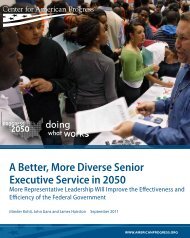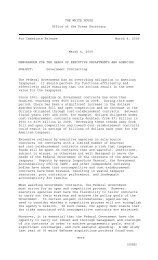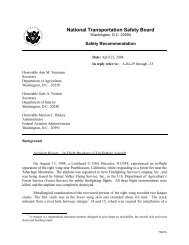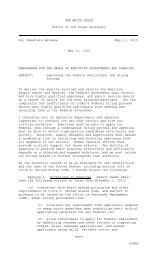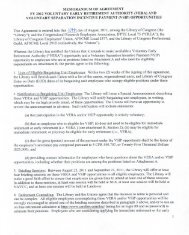Report - Government Executive
Report - Government Executive
Report - Government Executive
Create successful ePaper yourself
Turn your PDF publications into a flip-book with our unique Google optimized e-Paper software.
• The Commerce Department used focus groups to gather employee input, which informed<br />
system modifications;<br />
• TSA implemented an online “idea factory” to solicit employee suggestions to improve<br />
the system. Ground rules for this online dialogue limited discussion to constructive ideas<br />
on specific topics, such as evaluation criteria, rather than individual complaints; and<br />
• TSA established a National Advisory Council composed of employees from around the<br />
country, selected by their peers to serve two-year terms. The council interacts with<br />
agency leadership and program offices on a regular basis.<br />
OUSD(I) has engaged employees through town hall meetings and surveys while components<br />
have held their own town halls and other events like brown bag lunches and discussion groups.<br />
However, the purpose of these forums primarily has been to “push” information outward, rather<br />
than obtain workforce input.<br />
In addition to these broader mechanisms, OUSD(I) partnered with ODNI to involve SMEs in ICwide<br />
focus groups. For example, 147 SMEs from eight components participated in 19<br />
workshops to develop and validate exemplar performance objectives. In another focus group, 37<br />
SMEs from 11 components developed and validated performance standards. As a follow up to<br />
this effort, a survey was provided to all IC agencies to validate the results, though not all<br />
participated.<br />
Intelligence component HR staff have been involved in DCIPS development and implementation<br />
through annual conferences and participation in the DCIPS Working Group and subgroups on<br />
Resources, Implementation, and Communications. The working group provides an opportunity<br />
for them to provide input and discuss issues, but meeting minutes indicate that it primarily has<br />
been used as a mechanism for OUSD(I) to provide information.<br />
In GAO-sponsored focus groups, intelligence component employees reported that their<br />
involvement in DCIPS development and implementation was limited or nonexistent. 135 In<br />
addition, an ODNI assessment of IC pay modernization based on 50 interviews conducted with<br />
professionals from NRO, ODNI, NGA, NSA, DIA, and OUSD(I) concluded that stakeholders at<br />
every level must be more involved in the process. For example, managers and supervisors<br />
reported that they were informed, but only somewhat included. 136<br />
Academy online dialogue and focus group participants indicated that they were not adequately<br />
included in DCIPS development and, as a result, felt that the system was imposed on them. That<br />
most online dialogue participants used it as a forum to air their concerns—rather than offer<br />
constructive suggestions and ideas—underscores the fact that employees believe they have not<br />
been adequately heard. Participants in the open forums contrasted the opportunity afforded them<br />
in that venue with the more formal, lecture-style format of town hall meetings involving agency<br />
leadership and the workforce.<br />
135 2009 GAO Review, p. 8.<br />
136 IC Community (IC) Pay Modernization Project Office, “Stakeholder Analysis,” p. 13. (undated PowerPoint)<br />
77




